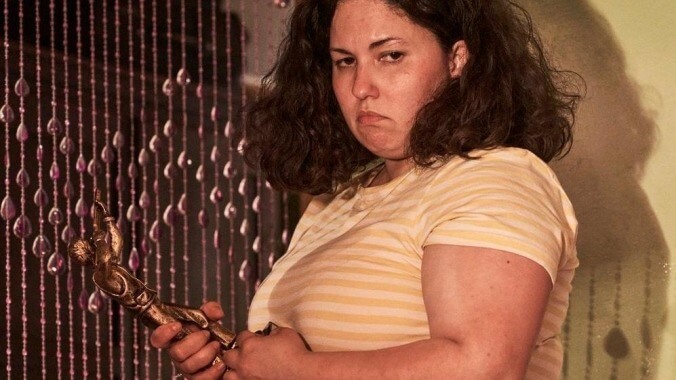In Piggy, body shaming and a slasher add up to a horror film with a twist
Laura Galan shines as a bullied teen in Carlota Pereda's solo feature debut

The poster for Piggy, with a blood-soaked girl standing in what looks like a defiant pose, strongly implies a particular sort of story that the movie itself doesn’t exactly offer. As one might reasonably assume, the girl in question is given the insulting nickname of the title and bullied. As one might not, this isn’t about her taking violent revenge upon her tormentors. Writer-director Carlota Pereda, in her solo feature debut that expands her previous short, adds a major swerve that takes things in a different direction from the usual underdog vengeance tale. Not that the opening pig head on a butcher hook is entirely misdirection, mind.
Sara (Laura Galán), who has the misfortune of also being the neighborhood pork butcher’s daughter, suffers exactly the sort of treatment expected from cruel teens, and then some. It’s bad enough that her best friend Claudia (Irene Ferreiro) turns on her in order to be popular with the pretty mean girls, but participation in a prank that nearly drowns Sara is especially atrocious. Sara’s not the only one to think so, either—a mysterious stranger (Richard Holmes), who looks like a missing Skarsgard brother with a powerlifter’s physique and perpetually open sleeveless shirt, also finds the harassment repellent. But unlike the relatively passive Sara, he takes action immediately.
It pretty quickly turns out that he’s a serial killer, drawn to the vain and shallow as victims, but now apparently drawn to Sara in an awkwardly romantic way on top of that. Seeing him haul away her tormentors in a van, she’s torn. What has she to gain by telling a truth that might only undercut the pain she feels her enemies brought on themselves? There’s pressure on her to offer any possible insights once the girls are declared missing, but also internal pressure not to—the killer’s still out there, and his attention is flattering. He’s a good-looking guy, after all. Can the two of them actually be together while offing their Spanish town’s worst people? Think Heathers if Martha Dumptruck were the protagonist and love interest instead of Veronica.
Abusive types are often drawn to women who present themselves as vulnerable victims, which is probably why the stranger has eyes for Sara. But what if his motives are actually purer? He’s less actively abusive to her than her supposed friends, and vulnerable women often seek power in finding assertive men. But like the narrative lure of cathartic vengeance, this line of thinking is a bit of a trap. Pereda’s not looking to make anybody feel good, onscreen or in the audience, but rather show that violence of all kinds simply perpetuates a brutal cycle. This includes the passive-aggressive variety, like the cruel diet-shaming Sara’s mother engages in, even as she threatens to fight anyone who calls her daughter fat.








































